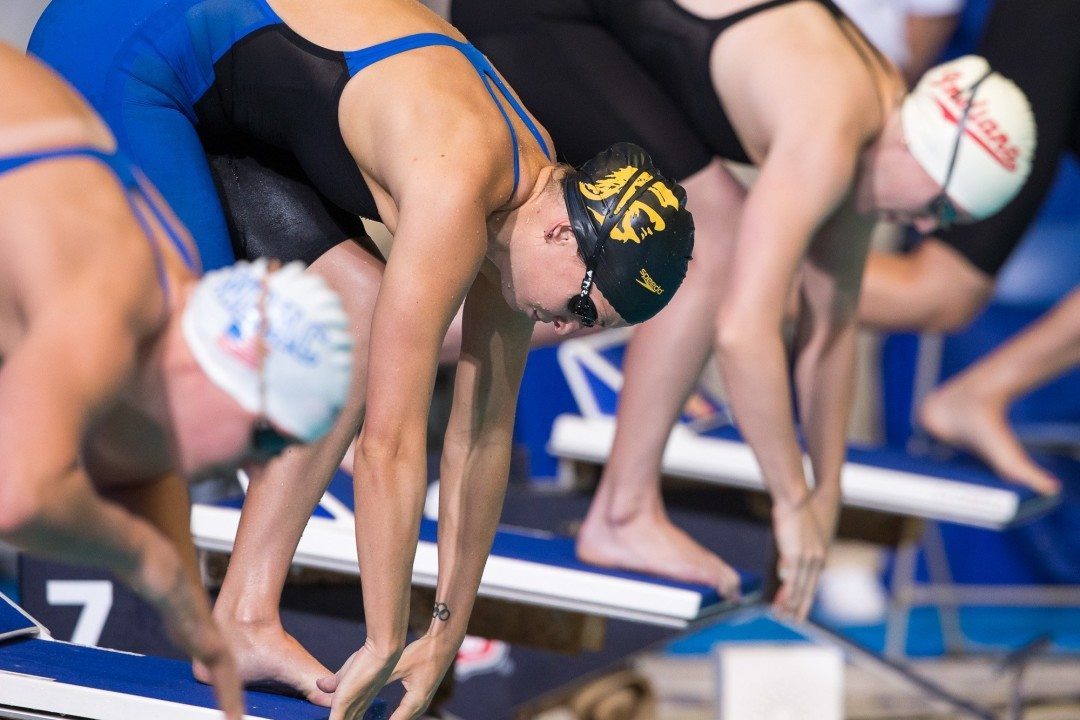Most swimmers are physically trained to perform their best at every meet. What they aren’t trained for are the thoughts that go through their minds leading up to their meet and their race. Swimmers all over the world feel like they could be getting better results for all the work they are putting into practice. But the reason why their results aren’t showing their hard work is because their brain is untrained. If your hard work isn’t showing, or if you get extremely nervous, have negative thought, or if you get intimidated at big swim meet, it is usually because you are psyching yourself out, which sabotages your performance.
Sometimes, there are uncontrollable aspects that can effect how you perform, but any swimmer who can mental push past that will have results that reflect their hard work. Here are some uncontrollable aspects to always be aware of:
- The venue and whether the pool is “fast” or “slow.”
- How your training and/or taper has gone up until this point.
- Your opponent’s size, reputation, and speed.
- Your last race and anything else in the past.
- How fast you’ll swim, whether you’ll final.
- Other’s expectations of you, what they’ll think or say about you.
- Who is watching.
- Whether your parents will be disappointed in you.
- Your coach and how he/she acts before and after your events.
- How big this meet or race is.
- How you feel that day, both physically and emotionally.
- How fast your teammates are swimming.
- The time of your races.
- The officiating.
- The kind of warm-up you have.
- Things going on in your life outside of swimming, whether is academic or personal.
- The unexpected, like the touch pads fail and you have to wait.
These uncontrollable aspects wait for you at every meet you attend and every race you swim. They are basically traps for the mind. Awareness is key to overcoming these uncontrollables. Once you become aware and focus on the things that you can control rather than what you can’t control, you can start to discipline yourself to quickly return your focus back to the things that are going on right now and not on aspects of the past. Also, you need to develop deep, inner belief of your own ability and what you know what you are capable of doing.
Mental training can be easier than practice, but it takes time. What most swimmers miss out on is the psychological benefits swimming gives swimmers. The psychological advantages of swimming are important to a person’s well being. Studies among both amateur and professional swimmers have shown that those who swim regularly experience less tension, depression and anger after practice and they gain significantly more energy through swimming. It is easy to see how swimming can help to relax the mind. Being in the water can take you away from it all for a short while, and the feeling can be a refreshing, relaxing and liberating experience as the water takes your weight.
Some advice to every swimmer out there: let go and allow your body to do what it has been training for. Let you mind focus on what your body is doing and not what could happen or what happened in the past. Allow yourself to feel it all, both mentally and physically, because once you do, your hard work will start showing in your results.
References:
- “Avoid the Biggest Mental Mistake Swimmers Make.” USA Swimming. COMPETITIVEDGE.COM, 10 Sept. 2014. Web. 01 Oct. 2015.
- “The Physical, Social and Psychological Benefits of Swimming.” ACTIVE.com. PR Log, Apr. 2010. Web. 01 Oct. 2015.
- “- Great in Swimming Training, but Not Receiving the Rewards? – Fabulous Swimming Technique / Strokes, but Losing to Lesser Swimmers? – Does Your Confidence Disappear at the Big Swim Meets? – Do You Worry Too Much about Your Competitors? – Do You Sometimes Even Feel Physically Sick on the Day of a Swim Meet? – Or Are You an Elite Swimmer Who Is Simply Trying to Move to the next Level?” Swimming Psychology. N.p., n.d. Web. 01 Oct. 2015.
